David Suzuki's Blog, page 22
November 30, 2016
Canada should be a leader in protecting nature
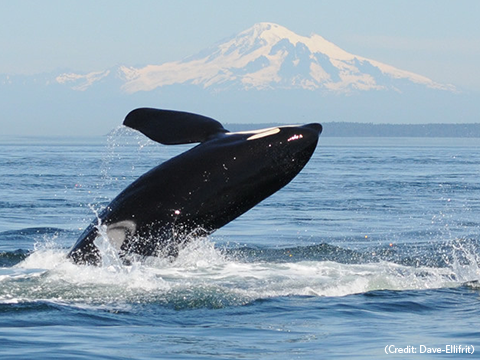
(Credit: Center for Whale Research)
Tell Prime Minister Trudeau you want your country to be a leader in protecting biodiversity.
Hey! Want more DSF? Join David Suzuki on Facebook
When it comes to engaging diverse audiences, the messenger matters
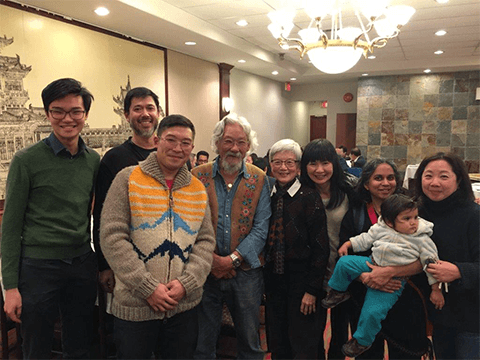
(Photo Credits: Winnie Hwo)
A year ago, the David Suzuki Foundation published a Sustainable Diversity Report based on our work to reach "beyond the choir." After that, 45 people from all walks of life came together to discuss the report's key findings and to strategize about next steps.
As a result of this initial gathering, 11 people came together to form the Sustainable Diversity Network. Its mandate was described as follows:
Our goal is to mix cultural inclusiveness with environmental stewardship. We aim to advance our understanding of sustainability and expand the environmental movement by celebrating voices and stories that are often unheard or unacknowledged.
We believe by connecting all Canadians with Indigenous people, we can learn about each other and share wisdom, history and stories about nature. We recognize that wherever our ancestors came from, we are all one in Canada for our love of the natural environment and our commitment to make it better for each generation.
On November 19, 2016, 150 people came to the Musqueam Cultural Pavilion to share their support for the Sustainable Diversity Network. Many also signed on to be a part of this network and help it grow in the years to come.
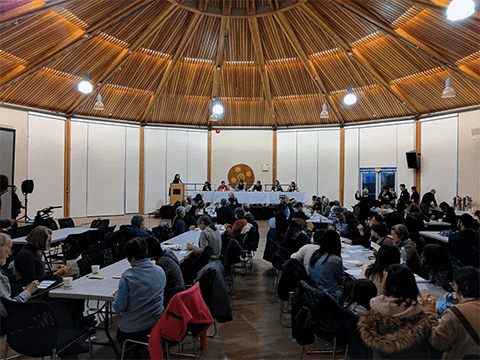

We showed the award-winning documentary Elder in the Making, which was met with a standing ovation for filmmaker Chris Hsiung and Blackfoot filmmaker Cowboy Smithx. That was followed by a heartwarming and information-packed panel discussion, during which network members and supporters confirmed that we are on the right track and have a solid foundation to move forward.
Panellists shared their thoughts about First Nations treaties and their impact on people.
Chris Hsiung: "A treaty should be much more than a paper contract. It should be a commitment of as long as the sun shines, grass grows and river flows."
Debra Sparrow (Musqueam Nation): "Laws that are created to diminish a people are not laws -- they are framework for a crime."
Eugene Kung (SDN member and lawyer): "We have been fighting the same fights over and over...our Canadian courts must go under their own process of decolonization. Wins can happen with Indigenous leadership and thousands of supporters."
Anu Rao (SDN member and Marine Biologist): "As Canadians, we tend to be passive. We need to hold our leaders accountable."
Zoe Craig (Musqueam Nation): "Unceded does not mean the land is up for debate. If the land is truly unceded, then give it back."
Cowboy Smithx: "Treaty 7 and other [treaties] were not made with men; they were made between men and the earth...At this moment, we should consider we are the ancestors of people we will never meet -- take this responsibility as something to be excited about as we are doing the work for many generations to come."
And from the audience:
"An insightful journey into the blanket ceremony of Turtle Island. Giving respect to all my relations. We are all one."
"We need to respect traditional and cultural practices as they teach us how to take care of this land."
"This is a beautiful film. It made me cry and I hope every young person can see it."
"I was struck by the insightfulness and eloquent wisdom and deep values of the Blackfoot elder and elder-to-be. I was surprised to hear that there was an oral agreement commemorated by pipe and a Victorian legal agreement made binding by pen and that there was no meeting of the minds at the end of the day around Treaty 7."
"Enlightening! While countries and continents have been decolonized around the world, the Indigenous people in Canada continue to remain colonized."
On next steps for the Sustainable Diversity Network, audience members had this to say:
"Education, dialogue and bringing more diverse groups together."
"Doing something physical outside, more learning, formal networking and international connections."
"Engage youth from our diverse communities..."
"You are doing it! Gather us together, create opportunities for connection and action. Thank you for this fantastic launch."
Judging from the feedback we received and the learning we shared in our 2014 report, it seems we have done right in at least these four areas:
Identify shared values and a cohesive vision
Add value to the community before asking for support
Be explicit in your commitment to "ongoing-ness"
The messenger matters
To sum up, I would like to borrow a few lines from our own SDN committee member and a truly fantastic messenger Toby Barazzuol:
"It's never easy launching a new network. But I think we did a fine job of it today in launching the Sustainable Diversity Network for the David Suzuki Foundation. From the welcoming spirit of the Musqueam Nation to the screening of Elder in the Making to the thoughtful discussions that followed, we created a foundation of good energy and trust to build on in the months and years ahead."
Hey! Want more DSF? Join David Suzuki on Facebook
November 29, 2016
The delicious benefits of edible perennial plants

Oca is from the Andes and the bulb can be harvested after frost, once the above-ground greens die back. (Credit: Fluffymuppet via Flickr)
I aspire to eat more local foods -- out of my own garden, if possible.
So I took a perennial vegetables workshop by Solara of Hatchet and Seed @hatchetnseed. She introduced me to a new term, "edimentals" -- edible, ornamental plants -- and supplied a list.
Perennial vegetables are great because they:
Keep coming back!
Withstand pests better than annuals
Build and improve soil quality
Don't need tilling, leaving mycelial culture (mushrooms and other fungi) and soil structure intact
Increase aeration and water absorption
Create compost, add to topsoil and bring up nutrients from deep down when dropped leaves die back each year
Are edimentals -- delicious AND beautiful!
Artichokes
Need a warm, protected spot. Varieties include globe and cardoon (wild). Blanch stalks and eat them cooked, too! Warning: sunchokes or Jerusalem artichoke spread.
Asparagus
Buy crowns or start from seed. From seed to shoot takes three years! Before prepping your bed, think long-term (they live up to 40 years) and keep soil mounded.
Caucasian spinach
Grows well in shade. Eat shoots.
Chufa (a.k.a. tiger nut)
A sedge tuber found in wet areas. Popular in Spain.
Cinnamon yams (a.k.a. air potato or Chinese yam)
Grow in pots (even an old bath tub) since tubers are large and will go deep. Use the vine to create shade.
Daubenton kale
Hardy plant that grows more than two metres tall. Extremely nutritious due to many years accumulating minerals. Great flavour. Tender enough to eat raw.
Day lilies
Edible before flowers open. (Read about all edible parts.)
Earth chestnut
Easily grown from seed. Eat greens (similar to parsley) and crunchy tubers.
Garden giant mushrooms
Seed into wood chip paths. Edible at the "button mushroom" phase. Don't eat a lot!
Good King Henry
Enjoys shade. Eat shoots. Looks like spinach.
Ground nut
A nitrogen-fixing ground tuber with climbing vines. Native to the East Coast. Contains 16 per cent protein (potatoes are five per cent protein).
Hops
Eat shoots in spring.
Hosta
Edible early before leaves get big (when it looks a bit like asparagus).
Elephant garlic
A perennial leek. Eat as you would leeks or harvest entire bulbs.
Leaf celery (a.k.a pink plume)
Stronger tasting than celery. Leaves are great in soups.
Mashua
From the Andes. A single tuber costs about $3.50. Flowers and leaves are edible. Similar to oca.
Nettle (a.k.a. stinging nettle)
Best in early spring. Easy to grow from seed. Prefers a moist, shady area. Cook young leaves like spinach or use in tea. A popular dye plant. Promotes good soil. Great in compost but not very kid-friendly.
Oca
From the Andes. Needs full sun but can survive in partial shade. Harvest the bulb after frost, once above-ground greens die back. Once harvested, lay in the sun to sweeten. Prepare as you would potatoes.
Perennial onion
All parts are edible, even flowers! Varieties include Welsh, garlic chives and walking onions. Bees love 'em!
Rhubarb
Only eat stalks -- leaves and roots are toxic. Compost leaves. Happy near a compost heap!
Skirret (a.k.a. sweet root)
Related to dill, parsley, celery, cilantro and carrot. Shoots and roots taste like parsnip.
Sorrel
Great in soups or pesto! The French variety grows in clumps.
Turkish rocket
Eat shoots, flowers and leaves. Beware: This spreads!
Yakon
This giant tuber from South America is a heavy feeder and gets tall. Harvest after frost. Pot in winter, replant in spring!
Perennial plants:
Are often long-lived -- e.g., asparagus lives up to 40 years!
Create resilience when planted from seed (avoid moulds, pests and diseases from nursery plants)
Use microclimates around trees
Can be left all winter
Which perennials will you grow?
Sincerley,
Lindsay Coulter, a fellow Queen of Green
Hey! Want more DSF? Join David Suzuki on Facebook
A Simple Tool Kit for Citizen Activists
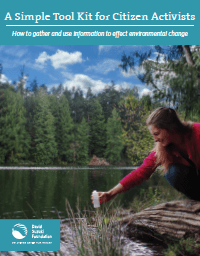
We at the David Suzuki Foundation get hundreds of calls and emails every month from citizens requesting help to deal with a wide range of environmental issues, including land-clearing and property development, aggregate mining, farming, clear-cut logging, landfilling (garbage and waste), garbage dumping, incinerators, water pollution, sewage disposal, illegal fishing, poaching, hydroelectric dams and oil and gas development.
The purpose of this tool kit is to provide basic and easy-to-use tools that will enable people to gather important and relevant information that can be used to protect their health and the environment in which they live and perhaps advance a contentious issue in an informed manner.
Hey! Want more DSF? Join David Suzuki on Facebook
Expanding pipelines now doesn't make environmental or economic sense
The federal government's decision today to move ahead with Kinder Morgan's Trans Mountain pipeline and Enbridge's Line 3 pipeline expansion flies in the face of efforts to prevent a 2 C increase in global average temperature, as Canada committed to in the Paris Agreement.
Giving a green light to the Kinder Morgan project, in particular, doesn't make sense from an environmental or an economic perspective. "This decision, along with the recent approval for Pacific NorthWest's highly polluting LNG project near Prince Rupert, is forcing fossil fuel infrastructure where it's not needed or wanted," David Suzuki Foundation director of science and policy Ian Bruce said. "We should finance a shift to renewable energy projects rather than support large, outdated infrastructure projects that lock us into climate-altering fossil fuel use for years to come."
The controversial decision comes amidst opposition from 59 First Nations and 21 municipalities representing more than two million people. The pipeline expansion would bring bitumen from Alberta's oilsands to B.C. for export.
If built, according to Oil Change International, "these projects would facilitate huge growth in the tar sands, increasing total greenhouse gas pollution by as much as 277 million tonnes of CO2 every year - equivalent to the pollution from 58 million cars on the road."
The David Suzuki Foundation opposes all fossil fuel infrastructure expansion, including Kinder Morgan's Trans Mountain pipeline expansion which will increase tanker traffic seven-fold. "British Columbians are right to worry about the effects of oil spills on sensitive marine environments, killer whales and their communities' health," David Suzuki Foundation Western Canada director general Jay Ritchlin said. "Oil spills will happen and they will never be fully cleaned up." Research confirms there is no spill response technology to effectively clean up diluted bitumen. "Even without an oil spill, this level of increase in shipping traffic is distressing for the future of the 80 remaining southern resident killer whales.
"The Salish Sea is an iconic part of Canada's economic, natural and cultural history, supporting wildlife and outdoor adventure and providing livelihoods to thousands in commercial fisheries and tourism. It's far too precious to risk a heavy crude oil spill and that's exactly what this project does," Ritchlin said.
Concerns have also been raised about limitations in the public consultation process and the collapse of public trust in the National Energy Board. "This is not a sound, evidence-based decision. We expect British Columbians to fight this decision and demand that Canada stop expanding fossil fuel infrastructure. Clean technology is the fastest growing sector in Canada's economy. That's where we need to invest in Canada's best interest," Ritchlin said.
- 30 -
Media contacts:
Jay Ritchlin, Director General Western Canada, David Suzuki Foundation
Phone: 604-961-6840
Theresa Beer, Senior Communication Specialist, David Suzuki Foundation
Phone: 778-874-3396
Hey! Want more DSF? Join David Suzuki on Facebook
CEO Peter Robinson completes nine years of service to DSF; new CEO sought
After nine years of leadership at the David Suzuki Foundation, CEO Peter Robinson is ready to hand over the reins. Robinson, who was previously CEO at Mountain Equipment Co-op and BC Housing, and has worked with BC Parks and the Red Cross, said leading DSF through many significant changes was his "most rewarding position."
"When I joined DSF, I had in mind a number of things I wanted to accomplish," Robinson said. "These included building a strong and successful organization, expanding our community to groups beyond our traditional followers through multicultural and large-scale digital outreach, ensuring we were national by creating a presence in Quebec and adding French to our communications, moving to a regional structure so we could address important local and provincial issues across Canada, and building a highly motivated management team. With this strong foundation in place, DSF is ready for the next CEO who can build on the best of our history and take us into the future of environmental education and advocacy."
DSF president and co-founder Tara Cullis said "We have been blessed to have Peter Robinson at our helm for nine excellent years and we're sorry to see him go. We wish him all the very best at his next enterprise and we know he will continue to do great good in the world."
All of us at the David Suzuki Foundation are grateful for Robinson's leadership and guidance and know he will continue to have success in his future endeavours. DSF is currently seeking a new CEO, working with recruiting firm Odgers Berndtson. For information, visit their website.
Hey! Want more DSF? Join David Suzuki on Facebook
Climate leaders don't expand pipelines
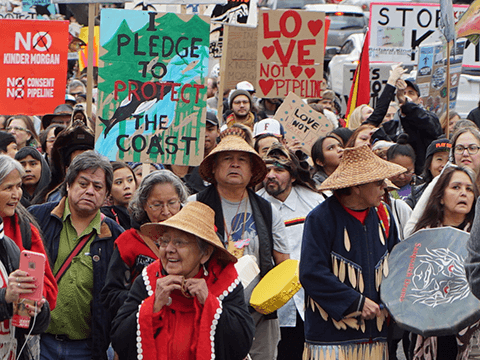
(Credit: Trevor Leach)
Please ask the federal government to rethink its pipeline approvals and to walk its climate action talk.
Hey! Want more DSF? Join David Suzuki on Facebook
November 28, 2016
What Canada's coal phase-out means

On November 21, 2016 the federal government announced a plan to speed up the shift off coal, Canada's dirtiest power source. Under the new regulations, Canada will be free of conventional coal-fired electricity by 2030.
This is a major win for public health, the environment and the economy. The David Suzuki Foundation's climate team has been working on this issue for more than a decade.
This success would not have been possible without the tens of thousands of people who sent letters to the government through our "Say no to coal in Canada" online action. Thank you! We delivered an anti-coal letter to Parliament Hill, representing almost 35,000 people in Canada, on the day of the government's announcement.
Why is the coal phase-out such a big win for the environment and climate?
Burning coal provides 11 per cent of Canada's electricity. But it's responsible for more than 70 per cent of carbon emissions from that sector. Around eight per cent of Canada's total carbon emissions come from burning coal for power.
In November 2015, the government of Alberta committed to phase out coal by 2030. Combined with that, ending coal power production in Canada by 2030 will likely be one of North American's single largest emissions reductions initiatives.
Not including Alberta's coal emissions, the federal government's announcement is equal to taking 1.3 million conventional cars off the road.
Why is the coal phase-out such a big win for human health?
Burning coal is one of the single biggest sources of carbon emissions on the planet. And it's terrible for human health. People in communities near coal plants breathe air laced with mercury, sulfur dioxides and particulate matter that penetrates into their lungs. This causes increased rates of childhood asthma, respiratory problems for the elderly and dozens of premature deaths each year. It's projected that the accelerated phase-out of coal power will save 1,008 lives, avoid 871 emergency room visits and save more than $5 billion in health-care and related costs between 2015 and 2035.
Click here to watch Dr. Joe Vipond talk about coal phase-outs around the world:
To find out more about the health and environmental benefits of a coal phase-out, see the Pembina Institute's report Out with the coal, in with the new.
What is carbon capture and storage and how will it factor in?
Carbon capture and storage is a technology built into coal plants to trap and hold emissions (usually underground) so they don't contribute to climate change. The federal government's goal is to close "traditional" coal plants and allow plants using CCS to capture 90 per cent or more of their emissions to operate.
CCS provides provinces with an option for cleaning up their electricity supply. But it's expensive. And the one coal plant in Canada currently using this technology has only been able to capture a small fraction of its emissions. Some scientists have voiced concerns about CCS. In Scientific American, Naomi Oreskes of Harvard University wrote CCS "is not working." Transitioning to renewable energy is a much cheaper option. Most coal-burning provinces will likely follow that path.
Methane (a.k.a. natural gas, fracked gas and shale gas) is another cheap option. But it also carries major climate concerns. It's the likely next target for a national phase-out as we shift to a clean energy economy.
What does this mean for Canadian coal mining and transportation?
Nothing. The coal phase-out only applies to emissions from coal burned on Canadian soil. The international precedent for climate change policies is limited to emissions produced within the country implementing the policy. Ensuring Canadian coal miners transition into the clean energy sector is a separate, important issue.
What does this mean for the price of electricity?
Nothing -- for the vast majority of Canadians. For those living in provinces relying on coal, the effect depends on how their provincial government moves forward with a phase-out. Investing in high-cost solutions like CCS and nuclear power would likely increase electricity rates. Investing in gas plants will also likely lead to increased rates. For Canada to meet its international commitments, gas plants will need to close soon after coal plants.
The cost of renewable energy is low and falling. If provinces with affordable renewable energy capacity (such as Saskatchewan) invest in this growing sector, they can maintain affordable electricity rates, grow their economies and ensure long-term jobs. Revenue from carbon pricing and trading energy between provinces can also help offset the cost of updating electricity grids.
What does this mean for renewable energy?
The renewable energy transition will advance faster if coal investment and expansion stop. Solar and wind, in particular, are well-positioned to replace coal in Saskatchewan, for example. That province has tremendous, untapped potential.
Hey! Want more DSF? Join David Suzuki on Facebook
November 24, 2016
Better discourse for a kinder world
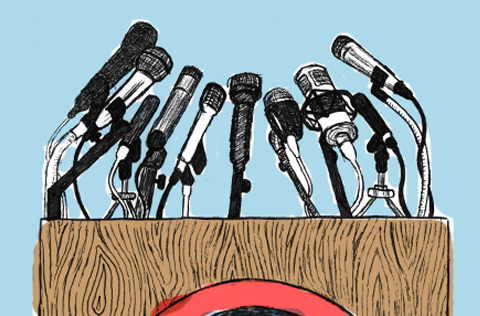
(Credit: opensource.com via Flickr)
The U.S. election was a chilling illustration of the atrocious state of public discourse. It doesn't bode well for a country once admired for leadership in education and science.
As public relations expert and former David Suzuki Foundation board chair James Hoggan writes in I'm Right and You're an Idiot, "polluted public discourse is an enormous obstacle to change." How, he asks, do we "create the space for higher quality public debates where passionate opposition and science shape constructive, mind-changing conversations"?
If those vying to be president of the most powerful country in the world couldn't do it, what hope is there? For his book, co-written with Grania Litwin, Hoggan interviewed a range of thinkers, from linguist and cognitive scientist George Lakoff to the Dalai Lama. Whether or not their insights can raise the level of political discourse among politicians who think name-calling, logical fallacies and lies constitute legitimate debate remains to be seen, but the book offers advice for anyone who wants to improve conversations and create positive change in this age of online bickering, propaganda and entrenched positions.
Social psychologist Carol Tavris says part of the problem relates to "cognitive dissonance." Unlike scientists, who revise their positions in response to testing and challenging hypotheses, most people resist changing their minds, especially if they feel it would threaten them or their real or imagined privileges.
Yale Law School psychology and law professor Dan Kahan says confirmation bias and motivated reasoning also come into play. Confirmation bias is people's tendency to seek and select information that confirms their beliefs. Motivated reasoning is the unconscious habit of processing information to suit an end or goal that doesn't necessarily conform to accurate beliefs.
Climate change is a good case in point. Although evidence for human-caused global warming is backed by mountains of research compiled over decades by scientists from around the world, and its impacts are observable, many people refuse to accept it, promoting debunked ideas and fossil fuel industry talking points, because they feel profits or their way of life will be negatively affected by addressing it. "When you have a combination of economic, ideological and psychological biases all in play, it's very difficult for human beings to easily accept large-scale social and economic change," Tavris observes.
So how do we overcome these stumbling blocks, especially when climate change deniers hold power in the U.S.? In looking at changing perceptions and habits around things like seatbelts, smoking and environmental protection, Tavris argues that dialogue and changing people's hearts isn't enough, that "you have to first change the laws, change public notions of what is acceptable or unacceptable behavior and change the economic consequences of practices you want to alter." That's more than a challenge in the current political atmosphere.
But we have to start somewhere. And improving the ways we communicate with each other is essential. Much of current discussion around the U.S. election result centres on politicians not listening to those left behind as global trade and technology outpaced antiquated economic systems. Many say the Democrats failed in part because they abandoned those who lost livelihoods in coal mines or factories as technologies changed and corporate leaders shifted production to parts of the world with lower labour costs and standards. Although the president-elect's choices of appointments and advisers show he's deep in the pockets of corporate America, especially the fossil fuel industry, he succeeded in tapping into the disillusionment.
We must listen to those who are suffering. We should also consider the difference between debate and dialogue. As social scientists Steve Rosell and Daniel Yankelovich tell Hoggan, "debate is about seeing weaknesses in other people's positions, while dialogue is about searching for strength and value in our opponents' concerns."
Vietnamese Buddhist monk Thích Nhất Hạnh says, "Speak the truth, but not to punish." While facts and reason are important, Hoggan points out, they're not enough to change people's minds. "Research coming from cognitive and brain science tells us if we want to be persuasive we must appeal to people's values and speak from a moral position, rather than layering on more data and statistics."
The world is in a precarious position. Hoggan's book offers a path to the kind of discourse necessary to resolving our collective problems.
Hey! Want more DSF? Join David Suzuki on Facebook
Celebrated authors join growing movement to clean up mercury mess in Grassy Narrows
TORONTO, NOVEMBER 24, 2016 -- This week, more than 60 of Canada's most celebrated authors joined the growing movement to clean up mercury contamination in Grassy Narrows, a northern Ontario community. The people of Grassy Narrows First Nation have been exposed to mercury in their waterways and fish since a pulp and paper company dumped almost ten tonnes of the potent neurotoxin on their site in the 1960s. In parliament yesterday, Ontario environment minister Glen Murray promised that the province will clean up mercury from the English-Wabigoon River system.
"While we applaud the minister for promising to act, we need an immediate commitment from the premier with a budget and timeline," David Suzuki Foundation science projects manager Rachel Plotkin said. "We applaud the authors for standing with the Grassy Narrows community, and call on the Ontario government to follow through on its long-awaited promise to make the fish safe to eat and the water safe to drink."
More than 60 celebrated Canadian authors (including Vincent Lam, Margaret Atwood, Joseph Boyden, Lawrence Hill, Yann Martell and Madeleine Thien, winner of this year's Governor General's Literary Award and Scotiabank Giller Prize) joined the growing movement calling for an immediate cleanup.
"I am deeply moved that writers in Canada stand with Grassy Narrows -- to see that the right thing is done," acclaimed author and medical doctor Vincent Lam said. "It is time for this mess to be cleaned up."
To demonstrate that they stand with Grassy Narrows First Nation community members, authors began sharing photos of their feet on social media this week with the hashtag #standwithgrassy. The posts encourage others to take action by sending a letter to Ontario's premier and Canada's prime minister through the David Suzuki Foundation's website (www.davidsuzuki.org/standwithgrassy).
The authors join a diverse group of celebrities, musicians, artists and advocates, including David Suzuki, Rachel McAdams and Jane Fonda, who are also standing with Grassy to demand a cleanup.
- 30 -
For more information, please visit www.davidsuzuki.org/standwithgrassy or contact:
Jode Roberts, David Suzuki Foundation, 647-456-9752, jroberts@davidsuzuki.org
List of #standwithgrassy writer supporters -- as of November 23, 2016: Andre Alexis, Angie Abdou, Margaret Atwood, Mona Awad, Deni Ellis Béchard, Dennis Bock, Joseph Boyden, Cathy Marie Buchanan, Catherine Bush, Jowita Bydlowska, Sasha Chapman, Karen Connelly, David Cronenberg, Anthony De Sa, Esi Edugyan, Marina Endicott, Charles Foran, Will Ferguson, Douglas Gibson, Graeme Gibson, Don Gillmor, Charlotte Gray, Rawi Hage, Elizabeth Hay, Teva Harrison, Kenneth J. Harvey, Lawrence Hill, Miranda Hill, Wayne Johnston, Adrienne Kress, Alice Kuipers, Vincent Lam, Kateri Lanthier, Catherine Leroux, Linden MacIntyre, Stephen Marche, Yann Martel, Ken McGoogan, Bruce Meyer, Lisa Moore, Marina Nemat, Michael Ondaatje, Laurence Packer, Christine Pountney, Andrew Pyper, Michael Redhill, Robert Rotenberg, Elizabeth Ruth, Robert Sawyer, Sarah Selecky, Antanas Sileika, Merilyn Simonds, Johanna Skibsrud, Linda Spalding, Eva Stachniak, David Suzuki, Ania Szado, Madeleine Thien, Miriam Toews, Ayelet Tsabari, Jane Urquhart, Russell Wangersky, Zoe Whittall, Michael Winter, Alissa York.
Hey! Want more DSF? Join David Suzuki on Facebook
David Suzuki's Blog
- David Suzuki's profile
- 247 followers



